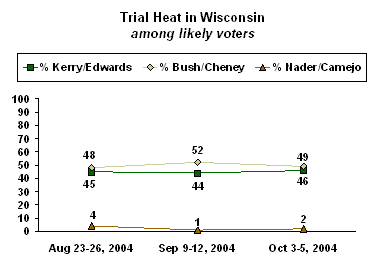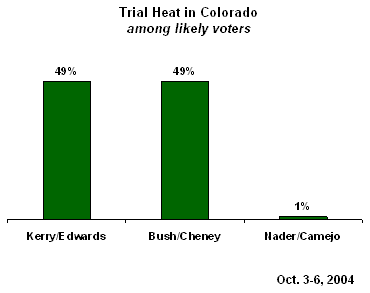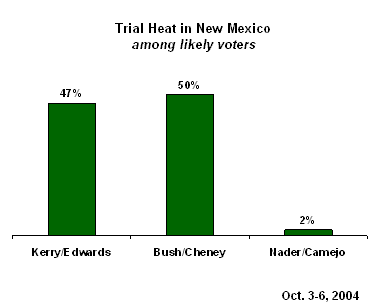GALLUP NEWS SERVICE
PRINCETON, NJ -- New CNN/USA Today/║┌┴╧═Ї polls conducted in three key showdown states all show close races after the first presidential debate. With President George W. Bush and Democratic candidate John Kerry tied on a national basis in the most recent CNN/USA Today/║┌┴╧═Ї poll, the two candidates are even among likely voters in Colorado, and Bush's slight advantages in Wisconsin and New Mexico are within the polls' margins of error. Bush had previously held a statistically significant lead over Kerry in Wisconsin.
The three state polls were conducted between Oct. 3 and Oct. 6.
Wisconsin
The Oct. 3-5 Wisconsin poll shows 49% of likely voters in that
state supporting Bush and 46% supporting Kerry, while 2% support
independent candidate Ralph Nader. Among the larger pool of
registered voters, the results are similar, with 48% for Bush, 45%
for Kerry, and 3% for Nader.
That represents a shift in Kerry's direction from the prior Sept. 9-12 poll, which showed Bush leading Kerry by 52% to 44% among likely Wisconsin voters. An earlier poll, conducted in August, showed similar results to the current ones, with Bush at 48% and Kerry at 45%. Wisconsin, which in 2000 narrowly awarded its electoral votes to former Vice President Al Gore, looked like a prime candidate for a Bush gain in 2004. The race now appears closer and the Badger State will continue to be a key front in the 2004 campaign.

In addition to their current voting intentions, Wisconsin voters were asked which candidate could better handle each of three issues -- the economy, Iraq, and terrorism. On the economy, the candidates are even among likely voters, with 48% saying Kerry and 48% saying Bush can better handle it. Bush has an advantage on the two foreign policy issues -- 53% to 44% on Iraq and 54% to 41% on terrorism.
Colorado
Colorado was a solid "red state" in 2000, with Bush defeating Gore by eight percentage points. But things have changed in this election, and the Oct. 3-6 CNN/USA Today/║┌┴╧═Ї Colorado poll shows the candidates even at 49% each among likely voters, with Nader (running as the Reform Party candidate there) at 1%. Registered voters in Colorado are also even, with 48% supporting Bush and Kerry and 2% supporting Nader.

The poll also asked about the key U.S. Senate race in Colorado. The Democratic Party is hoping to pick up the seat currently held by retiring Republican Sen. Ben Nighthorse Campbell in hopes of regaining the partisan control of the Senate it lost following the 2002 elections. If the election were held today, the poll suggests that the Democrats would be successful, with Democratic candidate and current state Attorney General Ken Salazar leading Republican candidate Pete Coors, heir of the famous brewing company, by a 54% to 43% margin among likely voters.
New Mexico
New Mexico narrowly went for Gore in 2000, with the Democratic candidate prevailing by less than a percentage point. The Oct. 3-6 CNN/USA Today/║┌┴╧═Ї in that state shows 50% of likely voters supporting Bush, 47% Kerry, and 2% Nader. Among registered New Mexico voters, 47% support Bush, 46% Kerry, and 3% Nader.

New Mexico has a large Hispanic population, and Hispanic registered voters in that state currently prefer Kerry by a 54% to 38% margin. Among non-Hispanic whites -- who historic and current data show are more likely to turn out to vote than Hispanics -- Bush leads by a 56% to 40% margin.
Survey Methods
Results are based on telephone interviews with 820 registered voters in Colorado, aged 18 and older, conducted Oct. 3-6, 2004. For results based on this sample, one can say with 95% confidence that the margin of sampling error is ±4 percentage points.
Results for likely voters in Colorado are based on the subsample of 667 survey respondents deemed most likely to vote in the November 2004 presidential election, according to a series of questions measuring current voting intentions and past voting behavior. For results based on the total sample of likely voters, one can say with 95% confidence that the margin of sampling error is ±5 percentage points. Based on past voting history in Colorado, turnout is assumed to be 60% of the voting age population.
Approximately 2% of all interviews were conducted in Spanish.
Results are based on telephone interviews with 885 registered voters in New Mexico, aged 18 and older, conducted Oct. 3-6, 2004. For results based on this sample, one can say with 95% confidence that the margin of sampling error is ±4 percentage points.
Results for likely voters in New Mexico are based on the subsample of 673 survey respondents deemed most likely to vote in the November 2004 presidential election, according to a series of questions measuring current voting intentions and past voting behavior. For results based on the total sample of likely voters, one can say with 95% confidence that the margin of sampling error is ±4 percentage points. Based on past voting history in New Mexico, turnout is assumed to be 50% of the voting age population.
Approximately 3% of all interviews were conducted in Spanish.
Results are based on telephone interviews with 837 registered voters in Wisconsin, aged 18 and older, conducted Oct. 3-5, 2004. For results based on this sample, one can say with 95% confidence that the margin of sampling error is ±4 percentage points.
Results for likely voters in Wisconsin are based on the subsample of 704 survey respondents deemed most likely to vote in the November 2004 presidential election, according to a series of questions measuring current voting intentions and past voting behavior. For results based on the total sample of likely voters, one can say with 95% confidence that the margin of sampling error is ±4 percentage points. Based on past voting history in Wisconsin, turnout is assumed to be 65% of the voting age population.
In addition to sampling error, question wording and practical difficulties in conducting surveys can introduce error or bias into the findings of public opinion poll.
